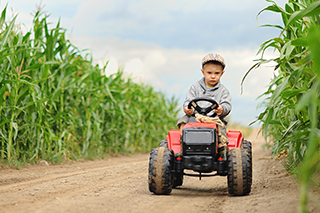Safe Play Areas For Children
Apr 21, 2021

While visiting a playground at a local park or school, we trust that the area is ultimately a safe space for our children to frolic and play. However, we likely do not always give the same attention to detail in creating safe play areas at our homes or near our farms. According to the National Children’s Center for Rural and Agricultural Health and Safety, a safe play area is a carefully and thoroughly planned in a designated location with limited exposure to hazards such as traffic, agricultural production, and environmental concerns. The play area on a farm should be:
Every three days in the United States, a child dies due to an agriculture-related incident and every day, 33 children are injured due to an agriculture-related incident. According to 2014 data, more than 23.8 million youth visited farms across the United States. During these visits while fostering a child’s passion for agriculture and curiosity for farm practices, large equipment, and animals, it is vital to keep safety at the forefront. Farms are busy workplaces, and while children who live on the farm may know this, visitors to the farm might not. We need to continuously educate that the farm is not a play area and should treat the farm with the same respect and care as any other workplace.
We always need to send correct messages. Avoid confusing children by replacing sand boxes with corn. A young child will have trouble understanding and identifying the difference between grain in a corn box and grain in a gravity flow wagon. In addition to sending the wrong message, other hazards around include chocking, allergies, crowding, and as a food source can attract animals and pests, which can cause illness due to germs from feces. Also, although creative, farm-themed playsets that encourage climbing and playing on equipment resembling the likeness of tractors, silos, and harvesters, can send unsafe messages to children.
Children deserve a safe place to play where they can create lasting, fond memories. Playgrounds and play areas do not become safer on their own. It takes caring from community members and people like you! If you notice something does not seem safe, speak up or act. To ensure the spaces our children love to play are as safe as can be, the National Program for Playground Safety has designated April 26-30, 2021 as National Playground Safety Week.
This safety message was brought to you by the Progressive Agriculture Safety Days, recognized as the largest rural safety and health education program for children in North America. For additional safety information or details about hosting, volunteering, or attending a Progressive Agriculture Safety Day, visit www.progressiveag.org or call us toll-free at 888-257-3529. Help send another child to a Progressive Agriculture Safety Day in 2021 and text the word “SAFETYDAY” to 44321.
Source: Jana L. Davidson, Education Content Specialist for the Progressive Agriculture Foundation
- Within sight and sound of a responsible adult, to allow effective supervision.
- Developmentally appropriate for the child’s age.
- Away from environmental, structural, and machine-related hazards. This can include loud noise, poor air quality, lack of shade.
- Designated by boundaries or physical barriers such as a fence.
- Supplied with protective ground surfacing to minimize fall related injuries.
- Full of play opportunities with activities allow children to experience physical, emotional, social, and intellectual development.
- Well-maintained with grass mowed, snow removed, and examined on a regular basis.
Every three days in the United States, a child dies due to an agriculture-related incident and every day, 33 children are injured due to an agriculture-related incident. According to 2014 data, more than 23.8 million youth visited farms across the United States. During these visits while fostering a child’s passion for agriculture and curiosity for farm practices, large equipment, and animals, it is vital to keep safety at the forefront. Farms are busy workplaces, and while children who live on the farm may know this, visitors to the farm might not. We need to continuously educate that the farm is not a play area and should treat the farm with the same respect and care as any other workplace.
We always need to send correct messages. Avoid confusing children by replacing sand boxes with corn. A young child will have trouble understanding and identifying the difference between grain in a corn box and grain in a gravity flow wagon. In addition to sending the wrong message, other hazards around include chocking, allergies, crowding, and as a food source can attract animals and pests, which can cause illness due to germs from feces. Also, although creative, farm-themed playsets that encourage climbing and playing on equipment resembling the likeness of tractors, silos, and harvesters, can send unsafe messages to children.
Children deserve a safe place to play where they can create lasting, fond memories. Playgrounds and play areas do not become safer on their own. It takes caring from community members and people like you! If you notice something does not seem safe, speak up or act. To ensure the spaces our children love to play are as safe as can be, the National Program for Playground Safety has designated April 26-30, 2021 as National Playground Safety Week.
This safety message was brought to you by the Progressive Agriculture Safety Days, recognized as the largest rural safety and health education program for children in North America. For additional safety information or details about hosting, volunteering, or attending a Progressive Agriculture Safety Day, visit www.progressiveag.org or call us toll-free at 888-257-3529. Help send another child to a Progressive Agriculture Safety Day in 2021 and text the word “SAFETYDAY” to 44321.
Source: Jana L. Davidson, Education Content Specialist for the Progressive Agriculture Foundation